Food packaging – what is the future?
Kareleen Nel Food Packaging Service and Application Manager for Sealed Air’s CRYOVAC® brand
Kareleen Nel of Sealed Air has more than 25 years of experience in the food packaging industry and helps food producers and food packers achieve their environmental goals by choosing the correct packaging material. She works for Sealed Air’s CRYOVAC® brand packaging solutions as the Service and Application Manager and is based in South Africa.
Kareleen manages Field Service Engineers and has also remained hands-on.
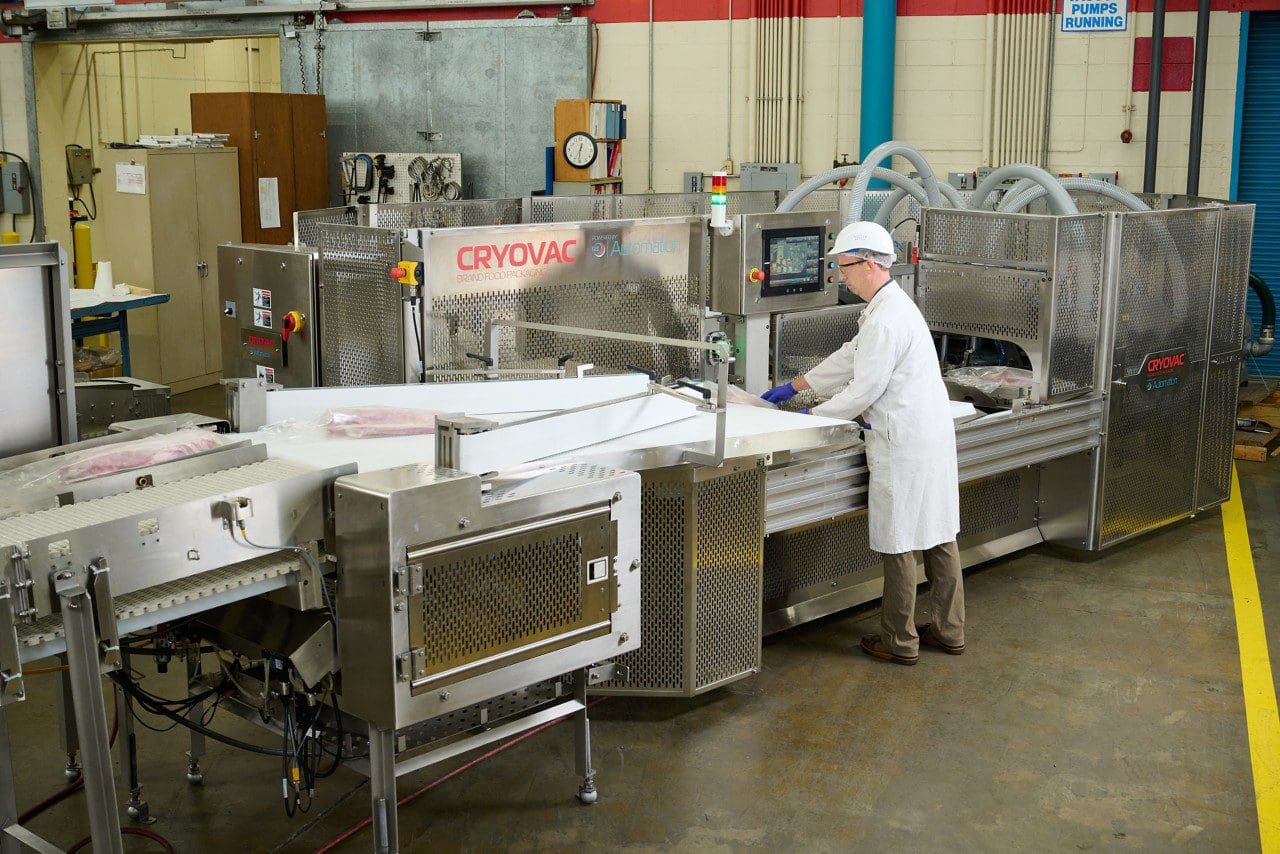

Background and path to Human Nutrition and Polymer Technology
Was there anyone in your family or school who guided you towards studying nutrition?
My love for science comes from a very young age. Since I can remember, I was interested in food. I analysed every food label of every food item, to establish and understand the macro and micronutrients. Instead of reading story books, I read nutritional books and food books to understand the science of food. My passion was to become a Dietitian.
Unfortunately, things did not work out for me to study Human Nutrition (Dietetics), so I took a gap year and went into the Military to decide what I wanted to do. It had to be something in science.
How did you decide to study Polymer Technology?
During my year in the military, I took an aptitude test, where I discovered that I had an aptitude for science and technology. During my discussion with the facilitator, I learned about Polymer Technology. Thinking that everything is moving towards plastic, I thought it was a good idea to go into this field.
Combining subjects
After my studies, I worked for a few companies before starting a career at Sealed Air. I loved every minute of working with plastics, especially when I started working for Sealed Air. I almost had the best of both, working with plastics in a food packaging environment.
However, my passion for food grew and I decided as a mature student to pursue my dream of studying Human Nutrition.
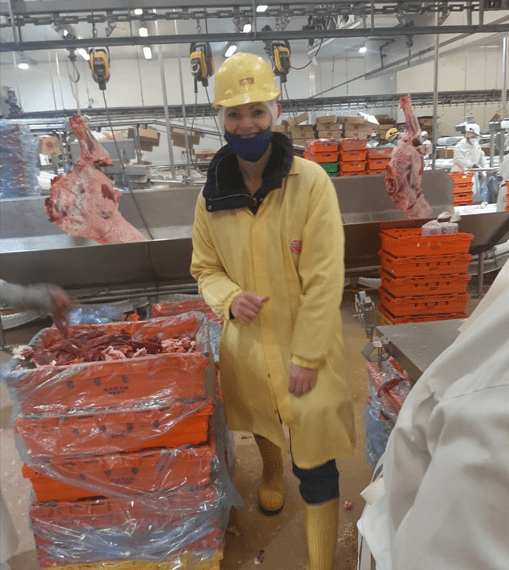

Working in the health sector
What did your work as a dietician involve?
During this time, I realised that it is not so easy to work with people in the health sector, especially competing against Google and all the fad diets available on the internet. I worked in the private and government hospital for about eighteen months as a Dietitian and realised that I missed the technical work of the plastics industry.
Working with people in such a close manner is very tiring and it drains all emotions out of you. You have to build a wall between you and the person that you are treating. You have to try not to become emotionally involved with that person, no matter what they are going through. It was difficult, but I also realised, even if you want to help every single person to become healthy, unfortunately it is not always in your hands.
What did you learn whilst working in healthcare and which of the skills have you taken into manufacturing?
It taught me to accept things that you cannot change and change the things that you are in control of.
Although helping people was my passion and still is, I soon realised that working in a technical environment was more satisfying. Here I could still help people in a different way, by being a mentor to colleagues, and sharing the experience and knowledge that I have gained over the years.
It was during this time that I decided to go back to the plastics industry and was fortunate to return to Sealed Air.
Typical day at Sealed Air as a Food Packaging Service and Application Manager
What drives you each day?
Getting my hands dirty and solving critical problems for customers and the Sealed Air organisation is what drives me every day.
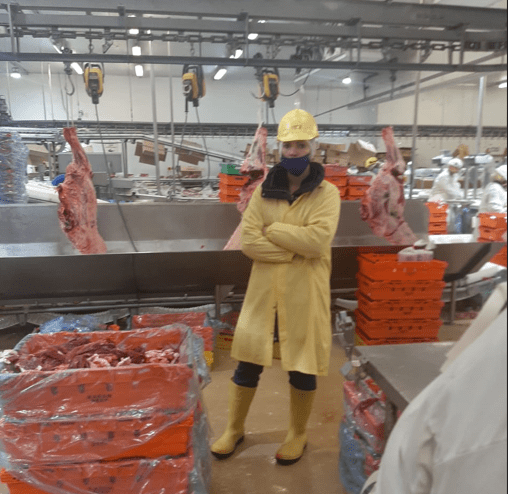

What’s your typical day/week like?
A typical day is difficult to explain.
No day is the same and you cannot plan your day, even if you want to.
A customer (meat packer or cheese packer) might phone, indicating that they have problems with material not working on their food packaging equipment. Dealing with the food industry, is a fast-paced business. Once food is prepared, it needs to be packed and there is no time to waste to get the problem resolved, if there are material or equipment problems.
How much of your role is troubleshooting?
Troubleshooting is almost a daily part of my job.
I have to leave everything that I am busy with to attend to the customer’s needs and problems.
Finding the root cause of the problem that the customer is experiencing with their food packaging process is exciting because no problem is the same. The satisfaction of getting the problem fixed and hearing the gratitude from the customer is what drives me.
New material testing for food packaging
Another major part of my job is to test new material on different equipment at different customers. Having knowledge of the material and equipment is crucial. I pride myself on being one of the few in the industry with knowledge of a vast number of pieces of equipment for the different food sectors.
Team management
What is your experience of management and team leading?
I have been fortunate that I have always been in a management / leadership type role. I think I became aware of my natural management ability at a young age, when my manager and mentor at that stage told me that I have a natural tendency towards leadership. Although I have developed a long way it is only in the last few years that I have fully understood what it means to be a manager or a leader.
How do you keep communication open with all members of your team and build relationships across the team?
Being a manager of a service team, involves proper and good time management. No matter how busy your day might be, you must make time for the team and their problems as well. We try to meet at least twice a week to catch up and to hear what is going on in everybody’s calendar, as well as what problems were encountered and where my assistance is needed to solve problems. There is almost always something that needs my attention within the team, and that is when things become a little crazy. But I have learned to prioritize the most important work items and that unfortunately some things will always have to wait for a few minutes or a few days.
Which other parts of the organisation do you give your time to?
Supporting the Sales team also takes up a lot of my time, with new product proposals or new equipment proposals depending on what the customer wants to pack.
Assisting Supply Chain with some process related issues also comes up every now and then as well as providing training to newcomers on materials.
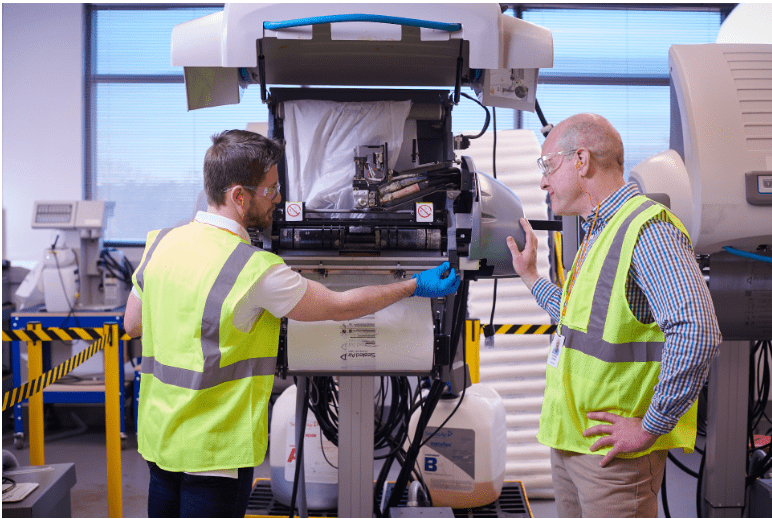

Future stars
How do you find the manager or team leader of the future? How do you mentor?
Today, my goal is to help people to become the best that they can be. I do not micromanage and believe that every person has the ability to make their own decisions. Goals and objectives are clearly defined, and we are all working towards the same goals and objectives. I am there for support and as a sounding board for ideas. At the end, they need to do what is best for them, as long as it is to the benefit of the organisation and our customers.
Something that I value very highly and the message that I pass to my team on a regular basis is that we always have to act ethically, with integrity and within the company policies and guidelines. I am a firm believer in this, and the team is well aware of my view on this and they all respect that and operate accordingly.
Building a team
How do you personally build a team?
Being a manager of people, you need to understand every person individually. You need to know what drives a person and what makes a person happy and what makes a person sad.
Having regular talks with the team on a personal note and providing support and assistance where I can and being empathetic helps keep the team motivated.
Everything will not always be smooth running, but there is a team, and we are there to support one another. I believe you need to have harmony in the team in order for the team to work effectively together. Every now and then, we will have a get together, share a meal or a drink and just be social.
How do you support someone in your team when things have gone wrong because of a mistake?
If mistakes happen, we solve the issues to the best of our abilities. No single person is perfect, and everybody makes mistakes. As long as we understand our mistake and rectify the mistake and learn from our mistake, that is what is important. Believe me, I have made some big mistakes. However, I remember my previous manager and mentor telling me:
“It is only plastic; it is not heart surgery.”
I remember that and apply it still today.
What is the key leadership skill in your opinion?
There is this saying:
“You are only as good as the people that work for you.”
That is so true. That is why it is important to let your team become the best they are, personally and in the work environment. So that they then want to give their best in everything that they do. Uplifting your team, for me personally, is one of the best leadership skills you can have.
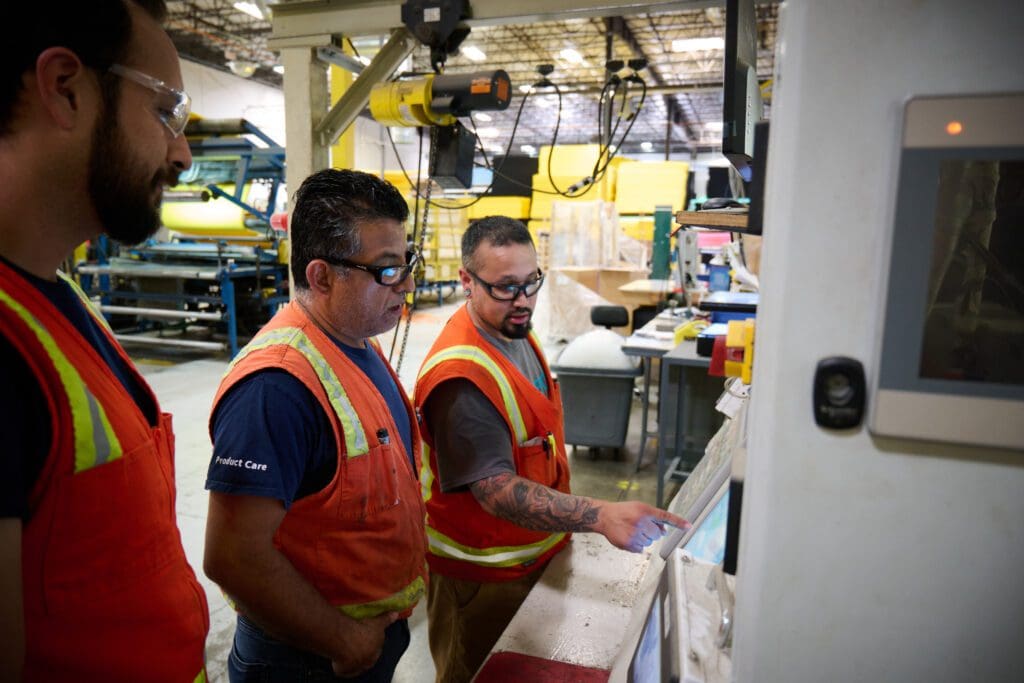

Most challenging part of the job in food packaging
What is the most challenging part of your role?
The most challenging part of my role is when everything happens at once. For example:
You have five customers phoning for a machine breakdown and you have three customers phoning with a material complaint and then there are administrative issues that need your attention.
Attending to all of it immediately is not possible. However, managing the situation to ensure that everybody is satisfied at the end of the day is what is important. This can sometimes be a little difficult, but luckily it does not happen every day. Tackling tasks day by day, item by item, is the only way to get issues resolved.
The most important skill here is prioritising, which I feel that I can do relatively well. I am a perfectionist with a little bit of OCD, so for me keeping to the deadline is massively important. If it means that I have to work an additional hour or two to get a specific task completed, I will do so.
Learning and reflecting
How do you personally keep improving and learning?
Taking time to reflect on your day’s work and what could have been done differently or better, helps me to become creative. It helps me to find solutions or new ideas on how to improve certain things, to become more proactive and less reactive.
Once again, I feel a person should learn from the mistakes made and ask the question:
“How could you have prevented a specific instance/scenario from happening?”
Using these reflection times and coming up with new ideas and discussing these with team members, helps me to be more productive and effective.
I believe that you cannot continue to do the same thing and expect different results. If something is not working, you need to change it for the better in order to be more successful.
Management styles
How have management and leadership styles changed to embrace diversity?
I often think about how management styles and leadership styles have changed over the years.
Today, we have to adapt our leadership and management styles to embrace our diverse cultures. That means that we can ensure that every person within a team and within the organisation feels included and feels that they belong.
I remember my first manager, and although I learned a lot from him, he also made mistakes. People do not react to fear, as a matter of fact, they retract into a bubble and then you cannot achieve anything. You need to develop and uplift the people you work with.
Field service engineer to manager in food packaging
How do you help new engineers become managers and leaders?
You have to mentor, coach, and help the younger generation so that they can also excel. I feel very strongly in giving back in this regard. You cannot keep the knowledge and experience that you have gained over the years for yourself, you have to share these with the people that can benefit from it.
If you see potential in a person to become a manager or leader, you need to help and guide and assist where you can, without becoming overbearing.
You need to let this person see their inner strength and ability in order to rise to also become a leader. I think the key is to identify those opportunities in people and to help them walk the walk to become what they need to or want to become.
What should a new field service engineer do to start to prepare for management?
My advice to any young field service engineer is to start leading. Remember, you do not have to have the title of manager to be a leader. You can lead within your team or within your organisation and by doing so, stand out as the potential new head of department. As well, you need to be conscious of people and what is happening in their lives. You need to be able to read people to establish if what they are saying is what they are meaning. There are many programmes that you can follow to help you get to know people. Today, people need to feel valued. You can only make people feel valued if you can understand them and know how to work with them.
Women in management
What advice would you give to women managers?
It has not been easy sailing being a woman in management. Women have their flaws, especially managing a team of men. I had to learn and take a few lessons on how to manage a male dominant team. I soon realised, that although I am a perfectionist, this does not help in the role that I am in. You need to understand the needs of the male dominant team and adapt your style accordingly. I had to learn to let small things go that used to bother me in the past, but in doing so, it became obvious that my job became a little bit easier.
There is a lot to learn and every day you learn something new. If I could give advice to women in management, it is:
“Do not be rigid in the way that you operate or manage.”
You need to learn to change yourself for the benefit of your team and the benefit of the organisation without losing focus and your goal.
What would you advise about work life balance?
Another important thing to consider is that you have to look after yourself as well. You need to keep a balance between work and being social or taking time to relax. You cannot just work without having some fun every now and then. For me it is sharing a good wine with friends and/or family on a regular basis.
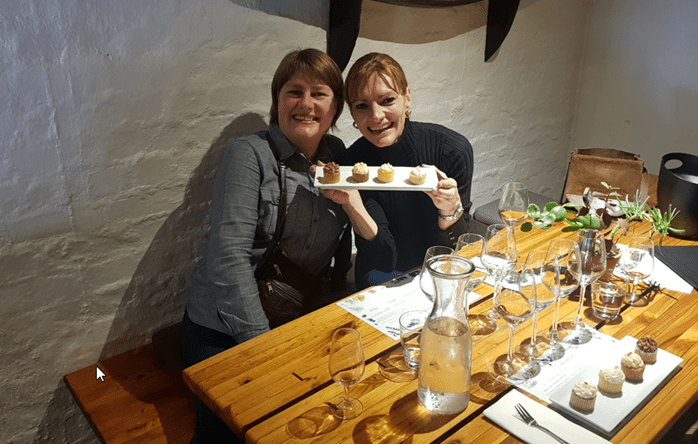

Plastics in food packaging
Packaging and particularly plastic packaging is a very topical issue. How do you explain the use of plastics to people not in the industry?
So, people often ask me:
“What do you do?”
When I reply that I am in the plastics industry, I immediately get a response of:
“So, you are the one polluting our earth.”
Unfortunately, people do not understand plastic and the different types of plastics. It is normally a long conversation where I need to explain that the purpose of what I am doing is to make sure that the plastic that we supply is sustainable.
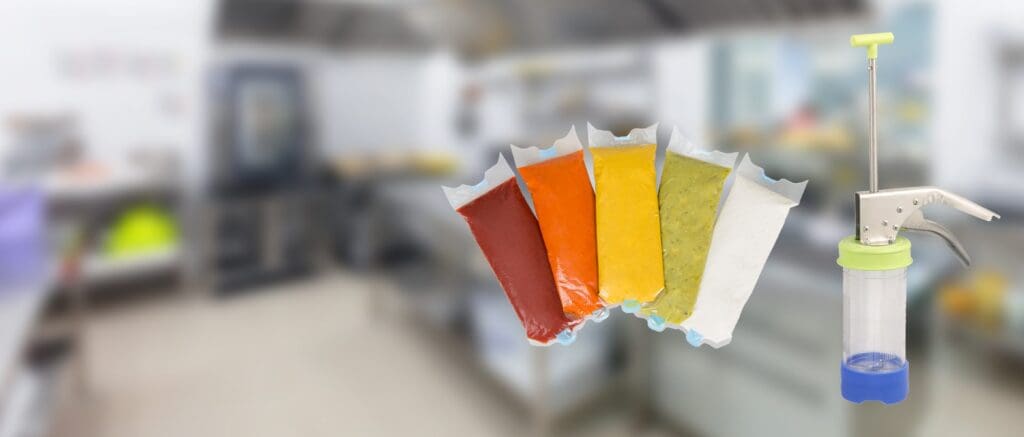

Single use plastic and essential plastic for food packaging
At the end, there are single use plastics and essential plastics. Essential plastic is needed for shelf-life extension of food.
With hunger and food shortages coupled with food waste, we need to be very resourceful with the resources that we have. We cannot afford to pack food which only lasts two days. In order to reduce food waste, we have to use specialised plastic materials, which are recyclable or sustainable, to achieve the maximum shelf life.
There is a benefit in using essential plastics and it often has a lower carbon footprint than using other packaging materials. It is important for me that people understand the difference. I am also against plastic pollution and I believe strongly in recycling and reusing and the actions to reduce plastic pollution. But we need to consider the cost of food waste as well. There are too many people who die of hunger every day to justify the needless dumping of tons and tons of food due to poor packaging. I think that is why I take my job so seriously.
My passion for both food and plastics help me drive this ambition.
Future changes in food packaging
How do you think packaging will change over the next 5 years? 10 years?
Food is going to become scarce and expensive. Resources are going to become scarce and expensive.
We need to work smart with what we have in order to make it last.
It really upsets me when I see people wasting food or people just dumping plastic. We need to think of the future and the planet that we are living on. It is not an everlasting pot that keeps on giving. That is why working with a company with such strong sustainable goals is what is making me proud and excited. We all need to work together to ensure that what we put out there is good for the planet, but also good for the human population.
Food and packaging
Why would you recommend this career to someone?
Every day is exciting for me.
It never feels as if I am going to work, because the passion that I have for food and plastic technology and packaging does not make it feel like work. I think if a person can reach that sense of satisfaction, all will be good. Someone asked me some time ago, if you won the lottery, would you still work. My response was:
“But of course.”
I enjoy what I am doing every single day and I feel I make a difference, even in a very small way. You need to have passion for what you are doing because then you will achieve two things:
to become the best in what you are doing
and loving what you are doing every day.
Further reading
Field Engineering at Sealed Air:
Sealed Air Company Showcase
Packaging and bottling:
Oluwaseun Adu Automation, Control and Instrumentation Field Service Engineer


Responses